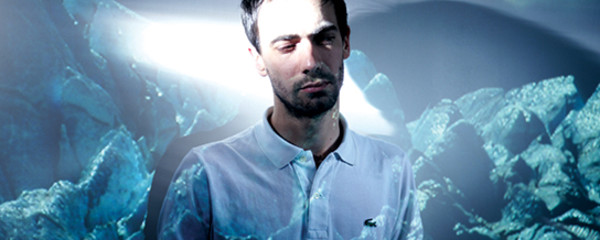Para One In the Studio
Producers like Para One are one-of-a-kind. Schooled in the ways of hip-hop and techno from […]
Para One In the Studio
Producers like Para One are one-of-a-kind. Schooled in the ways of hip-hop and techno from […]

Producers like Para One are one-of-a-kind. Schooled in the ways of hip-hop and techno from a young age (the former through the crew he joined at age 14; the latter through his cousin Saint Remy’s mixtapes), the man known to his maman as Jean-Baptiste de Laubier twists genres and beats with equal ease, while approaching his productions from an entirely DIY aesthetic–his formal sound-engineer training notwithstanding. His hybrid use of analog and digital machinery suggests obvious ties to the past, but squelchy , future-forward club hits like “Dun-Dun” and “Midnight Swim,” and his countless remixes for his French, British, and American contemporaries speak for themselves. He’s also the de facto producer for Parisian hip-hop group TTC, who sits in on “Musclor” on de Laubier’s full-length Epiphanie. Para’s signature thump hits harder than most mainstream rap producers–and holds its own on the dancefloor. We talked to Para One about how–and when–to get the most booty-bang for your buck.
XLR8R: Where is your studio located?
Para One: Near the République metro stop in Paris.
Is there anything special you do to prepare yourself to go in the studio?
First, I have to drive across Paris on my scooter–fast! Then I drink coffee–liters of it. Then I smoke cigarettes–a lot of them. Then I finally get sped-up enough and I can do music. And I do it as early in the morning as I can, sometimes as early as 5 a.m. The worst time for me to record is around 2 p.m.–that midday depression, where I have suicidal tendencies–but the energy comes back around 6.
Do you spend more or less time on your own productions than when you’re producing or remixing someone else’s stuff?
The time I spend on production is always very short, actually. It’s more about time that I spend thinking about production! And it can be really long when it comes to my own tracks. I just sit there, staring at my work for weeks, then suddenly I make a move and it’s finished within a day. I can’t explain why that is. But it’s much faster for the remixes, obviously, with A&R guys being on your ass all day.
Did you study recording at all? Or is it something that you think can be learned on your own?
I learned when I had to go to studios and pretend, in front of scary ghetto rappers, that I knew shit about what I was doing. Then it became actual knowledge! After that I did get a degree in sound engineering but don’t bother. Learn by yourself, definitely.
What’s the most personal thing you have in your studio?
My Sequential Circuits Pro-One synthesizer is my pal. You can’t ever tune the two oscillators together properly, so it always sounds a bit sad, like it can understand you and express it all. Especially for bass, it’s the best. Its sound hits your chest like real pain. But my favorite things in my studio besides the Pro-One are a Neve Kelso mixer, a Linn Drum, a Korg MS 20 with SQ10 step sequencer, and my Roland TR-808 drum machine.
What’s your favorite type of song to remix?
I love remixing songs with good acapellas and the right tempo. I’m fed up with the tearing-it-all-apart-then-putting-everything-back-together method… [Even in regular production] I rarely use samples. When it happens, I chop them up until they’re mine.
What’s your live show like? How do you make it exciting for the audience?
When I have to fly, I only take my Mac and a MIDI controller, because if I carry the 909 or the Pro-One with me, I just won’t make it to the venue–I’ll be hanging out with terrorists in jail instead. I use Ableton Live and Reason synchronized together though ReWire. It allows me to improvise more than just triggering loops in Ableton like every average, lazy-ass pseudo-performer is doing nowadays. It’s difficult to improvise, and to actually do something live. The key is to take risks, to add new ideas every time, and to learn stuff from the show–not just to “do the job.”
What about the visual experience?
[With others’ visuals], I just have to grin and bear it every time, what with those horrible, local homemade vids that make you feel sick or paranoid or depressed–like loops of subway shots or mutilated puppets dancing.
Anything you hate about production?
What I hate about producing is that every time you make something happen, you know you’re going to suffer from it later.

